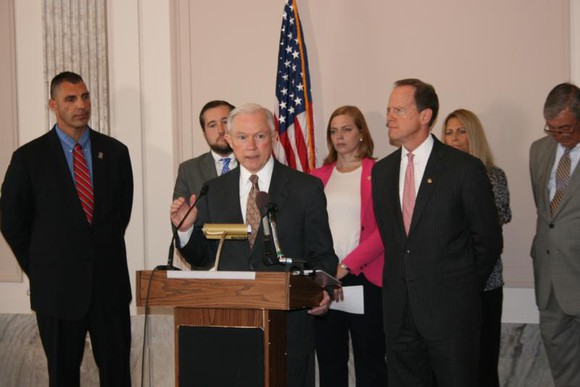You’d be hard-pressed to find an industry that’s growing at a quicker and more consistent pace than legal marijuana. According to Marijuana Business Daily‘s report, “Marijuana Business Factbook 2017,” U.S. weed sales are expected to catapult higher by 45% in 2018 and approximately 300% between 2016 and 2021. Should these estimates prove accurate, we’d be looking at $17 billion in annual sales by 2021.
Pivotal in this U.S. expansion has been the rapid and steady shift in the way the public views cannabis. Once considered a taboo topic, pot is something discussed as casually by politicians these days as Social Security. As of national pollster Gallup’s October 2017 survey, nearly two-thirds (64%) of all respondents were in favor of fully legalizing cannabis, which is the highest support percentage on record over nearly five decades of polling. Support for medical marijuana is even higher, with an August 2017 survey from Quinnipiac showing 94% favoring legalization, compared to just 4% opposed.
Support aside, the pot industry faces an uphill climb
Despite this support, Washington, D.C., and the American public continue to butt heads. Congress has effectively dug in its heels and refused to move on its current schedule I categorization for marijuana, meaning it has no recognized benefits and is on par with LSD and heroin in terms of being illicit.
This schedule I categorization comes with a host of issues that put cannabis research and pot-based companies at a pretty sizable disadvantage relative to “normal” companies. For instance, the red tape associated with cannabis being a schedule I substance makes running benefit-versus-risk analyses incredibly difficult for researchers. And without this data, lawmakers are unlikely to consider altering cannabis’ scheduling.
In terms of financial constraints, marijuana companies have little to no access to basic banking services. This is because financial institutions, which report to the Federal Deposit Insurance Corporation, fear being criminally or financially reprimanded at a future date for assisting pot businesses.
They also get hammered come tax time because of U.S. tax code 280E. In effect, 280E disallows businesses that sell a federally illegal substance from taking normal corporate income-tax deductions. This forces the pot industry to pay an effective tax rate that can often be between 70% and 90% of their profit, when 15% to 30% is what “normal” businesses pay.

But the biggest worry of all just might be Attorney General Jeff Sessions, who has directly stated his skepticism of medical and recreational cannabis on numerous occasions. In fact, in May, Sessions sent a letter to a few of his congressional colleagues requesting the repeal of the Rohrabacher-Farr Amendment, which is what protects medical marijuana businesses from federal prosecution — so long as they’re operating in legal states.
Despite Sessions’ clear vitriol toward the marijuana industry and his firm belief that “good people don’t smoke marijuana,” he’s effectively been an attack dog kept on a leash — all bark with no bite up to this point, primarily as a result of the constraints of the Rohrabacher-Farr Amendment. However, things could soon change, and not in a good way for the marijuana industry.
In September, when both houses of Congress began budget discussions following approval of a three-month federal spending bill that provided funding through Dec. 8, the House Rules Committee, which is majority-led by the GOP, blocked a vote on the Rohrabacher-Blumenauer Amendment (which is the same as the Rohrabacher-Farr Amendment, but with a different sponsor). Blocking this vote was the House GOP’s means of leaving this amendment that protects medical marijuana businesses out of the federal budget, allowing Sessions to potentially use federal dollars to prosecute marijuana businesses.
Here we go again
However, a two-week stopgap spending bill passed on Dec. 8 extended the protections of this amendment through Dec. 22. But if a new federal budget fails to include the Rohrabacher-Blumenauer Amendment, Sessions would be “off his leash” to go after medical marijuana companies as he sees fit. Said Rep. Earl Blumenauer (D-Or.) for whom the amendment is named:
While we are pleased that these critical protections will continue, two weeks is not enough certainty for the millions of Americans who rely on medical marijuana for treatment and the businesses who serve them. As Congress works out a long-term funding bill, it must also include these protections. And ultimately, Congress must act to put an end to the cycle of uncertainty and permanently protect state medical marijuana programs — and adult use — from federal interference.
Now, here’s the good news from the perspective of marijuana businesses: Even if the House Rules Committee blocks a vote to include the Rohrabacher-Blumenauer Amendment, the Senate can still include it in their budget proposal. According to John Hudak, a drug policy specialist and senior fellow at the Brookings Institution, in an interview with The Cannabist, a longer-term budget bill is likely to include the Rohrabacher-Blumenauer Amendment.
Additionally, letting Sessions off the leash to prosecute medical marijuana businesses might actually hurt the Republicans’ chances of passing their tax reforms. First, prosecuting cannabis companies and violating states’ rights would be very unpopular with the public, based on the aforementioned survey results. More importantly, though, these businesses are a source of federal tax revenue. With the GOP tax plan possibly adding $1.5 trillion to the deficit over the next 10 years, according to the Congressional Budget Office, they’ll need all the revenue they can get, including from pot businesses.
Still, there remains a chance that Rohrabacher-Blumenauer falls through the cracks during the next spending bill, exposing some marijuana stocks and cannabis businesses to the wrath of Jeff Sessions.
credit:fool.com















